Works
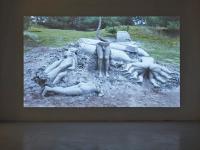
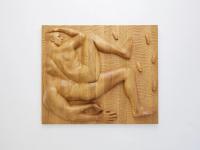
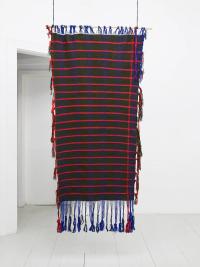
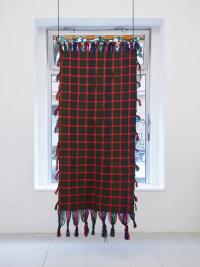
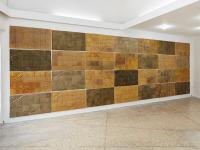
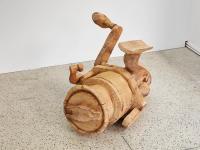
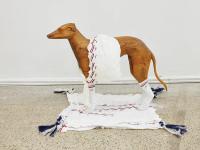
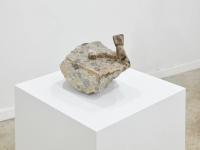
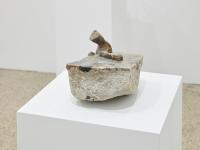
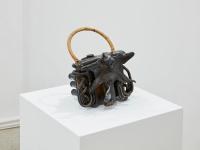
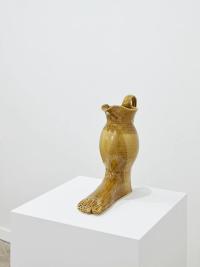
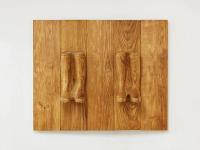
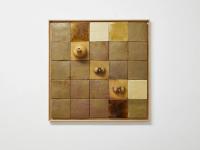
Installation Views
Press Release
Daniel Dewar & Grégory Gicquel Body of Work September 6 - October 20, 2019
Opening Friday, September 6, 6 - 9 PM
Jan Kaps is pleased to present an exhibition on the work of Daniel Dewar & Grégory Gicquel, the artists’ second with the gallery. Taking the form of a select survey of work, the exhibition includes works from 2006 to the present, and further highlights the different media—from stoneware ceramics, woodcarving, to textile and film projection—that the artists have worked with through the years. Having met during their studies at the École des Beaux-Arts in Rennes in 1997, the two artists have collaborated ever since. In 2001, the two opened a skate shop together as both an exhibition and fully-functioning store. This idea of sculpture existing only in a specific site is further highlighted in both the photograph, The Adobe Gang (2009), as well as the projection at Jülicher Strasse, a series of looped animated films tracking the process and development of large clay works the artists made in 2012.
These works, existing as both document and realised sculpture, equally bring forward the importance of time, and work occurring over time, that is prevalent in the material. Dependent upon each other, though the pair now work between Paris and Brussels, these colossal, and often delicate, sculptures are entirely and thoroughly completed by hand. This is a note that is important to the work, as the artists have declared that “there is no difference between the process of making and the object.” Providing the sculptures a sense of acknowledged history and, as Elena Filipovic has noted, the ability “to plumb the depths of the very idea of manufacture in our contemporary digital age,”1 there is a conceptual rigour latent in the practice and techniques used.
The sculptures on view in the gallery’s two spaces, consisting of a gigantic, multi-part stoneware mural of carp, an over-sized wooden fishing reel, a large wood panel of a contorted body, a sandstone faucet tap, boxing gloves made of kangaroo leather, and hanging tapestries translate this idea of rationalised manufacturing into a storied vessel, full of contradictions and re- alignments, that portrays any numerous flights of history. While many of the works refer to simple, utilitarian objects—a tap or a fishing reel—or references to the rural and pastoral are equally abundant—by the imagery of carps, fishing, or evident in the sculptures which are made in locales far from urbanity—the work has continually, progressively focused on the absurd position of artistic production, particularly in the face of increasingly rationalised and efficient systems. The artists’ most recent work embeds the body back into the material, as displayed in the substantial oak panel depicting a male figure with limbs askew or severed while its torso echoes classical examples of sculpture. It is a joining of the familiar with the fantastical, that, as Filipovic describes, is “almost alive in its organic materiality,”2 and keeps the story— of final artwork containing its laborious production—cognizant throughout.
While many of these works are being presented together for the first time, the underlying conceit of this show follows from the recently published catalogue, Body of Work (2019), the first large- scale book devoted to a history of the artist’s practice. Recounting an idea noted in the forward by Fabian Schöneich, the editor for the book, the exhibition is a “visual compendium that follows the duo’s activity,” and is “intended to highlight their interest in the raw nature of materials . . . to give an impression of how the artists developed their own conception of sculpture over the years.”3 As such, this book will be available and highlighted as part of the exhibition at the gallery.
1 - Filipovic, Elena. [Exhibition text to] Mammalian Fantasies. Kunsthalle Basel. January 2019 2 - Filipovic. ibid. 3 - Schöneich, Fabian. [Foreward to] Daniel Dewar & Grégory Gicquel: Body of Work. Portikus, Frankfurt & König Books, London, 2019.









